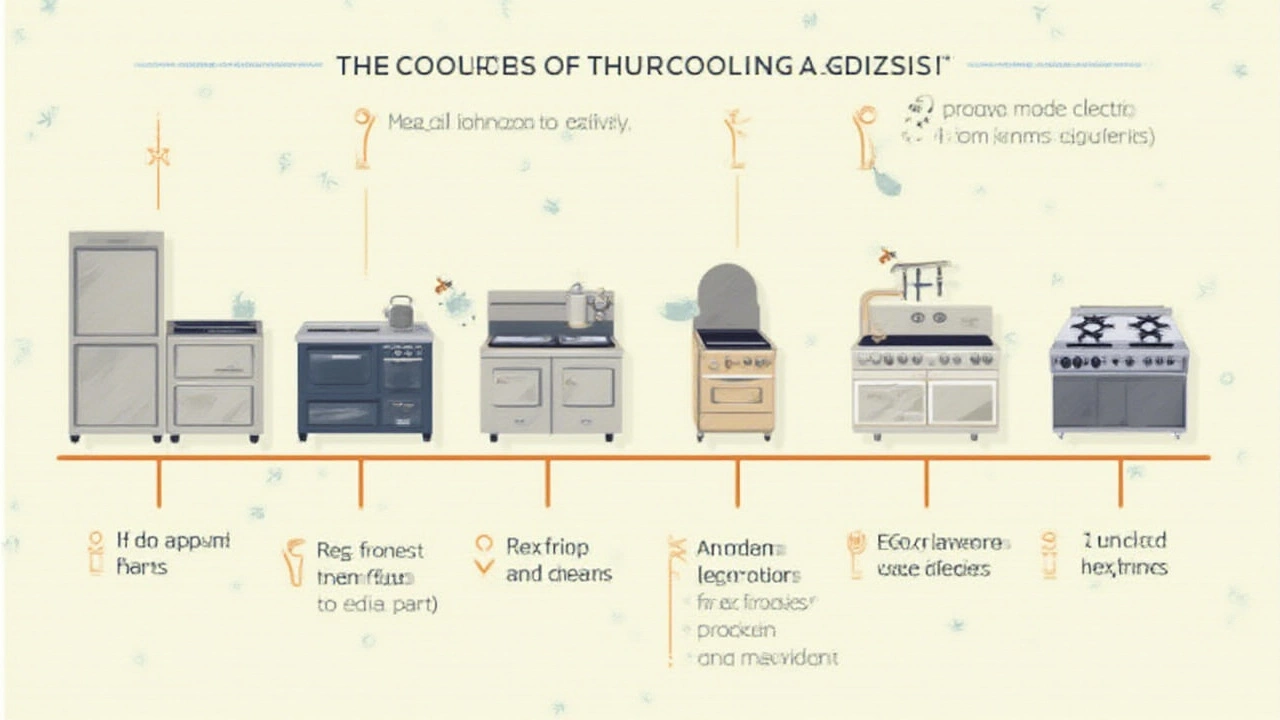When was the last time you thought about how long your cooker would keep going before it decides to quit at the worst possible moment—say, right when you’ve got friends around for a Sunday roast? Most people don’t give this everyday machine much thought until it’s already groaning and wheezing. But if you really peek into your kitchen’s heart, you’ll see that your cooker does a lot of heavy lifting, and it doesn’t last forever. The numbers might surprise you, especially if you’re one of those who hang onto things way past their prime, just like my old kettle that literally started leaking as it boiled. Knowing how long a cooker actually lasts can save you heaps of money, stress, and possibly even the embarrassment of serving half-cooked chicken to your mates. Let’s crack open the facts, stories, and insider knowledge—the kind I wish someone handed me before I first saw smoke coming out of mine.
The Real Numbers: Cooker Lifespan and What Impacts It
So, what’s the magic number? Most standard cookers, whether electric or gas, stick around for about 10 to 15 years on average, though that number can tilt either way depending on how you treat yours. According to the UK’s Association of Manufacturers of Domestic Appliances, gas cookers usually last on the lower side, about 10 to 12 years, while electric ovens can sometimes push towards 13 to 15 years if you don’t torture them with constant overuse. I once read a consumer study that flagged 11 years as bang-on average for everyday use, which really squares up with what I’ve seen in heaps of flats and houses around Auckland.
Your cooker’s lifespan isn’t just determined by flipping burgers and baking pies though. Several sneaky factors weigh in:
- Frequency of use: My mate feeds a family of six so burns through cookers every 7-8 years, while my cousin, who lives off takeaway, barely scrapes any wear after a decade.
- Maintenance: A cooker cleaned regularly, with spillages wiped up and parts checked, outlasts one neglected and caked in last winter’s lasagne.
- Quality and brand: Cheap models often give up first, and some older European brands have reputations for longevity—for example, vintage Aga and Rayburn machines have worked for decades on Auckland farms, but most of us use more standard fare.
- Electrical surges or dodgy wiring: Fluctuations, especially after storms, can fry controls or elements well before their real sell-by date.
- Hard water limescale: If you live somewhere with mineral-heavy water, limescale can clog or damage cooker parts over time.
I know, it sounds a bit unfair—you and I just want our meals cooked reliably, not to play appliance bingo. But knowing the average lifespan helps you plan. If you’ve just moved into an older house, peeking at the cooker’s sticker or serial code can sometimes tell you when it was born. If it’s pushing 10 years, start saving or at least keep an eye on deals.
Electric Cookers vs. Gas Cookers: The Pros, Cons, and Longevity Myths
Plenty of people argue about whether gas or electric cookers last longer. Here’s how it really shakes out: Electric cookers (including induction and ceramic hobs) tend to edge out gas models in longevity by a slight margin but can cost more to fix when something goes wrong. Why? Electric models have fewer moving parts, and no pilot lights or burners to clog up. But when they do break, it’s sometimes the electronic controls or elements that pack up, and those aren’t always a quick fix.
Gas cookers have the advantage of simple, fixable parts. If the ignition’s gone or a burner’s clogged, you can often sort it yourself with a brush and patience. But they are more prone to issues like blocked jets and leaks, especially as seals age. Also, in my experience, gas cookers are sensitive to poor ventilation and build-up of grease, which literally shorts their service life—your cooker doesn’t appreciate being smoked out any more than you do.
There’s a funny myth that says old-school appliances lasted ‘forever’ and new ones are made to break. To be honest, manufacturing has changed, so your average cooker from 1990 might weigh double what a modern one does and still be working in someone’s bach. On the flip side, today’s cookers have better energy efficiency and safety overrides, saving power bills and headaches. As with most stuff, paying a little more upfront gets you more years and fewer breakdowns. My friend Toni spent extra on a quality German brand and after 14 years, her oven still makes a mean pavlova. But I’ve also seen basic cookers burn out after just a few years in busy student flats that rarely see a cloth or cleaning spray.

Signs Your Cooker Is Nearing Retirement (And What to Do About It)
Your cooker won’t just suddenly keel over; it usually drops hints when the end is near. Here are some solid clues it’s nearly time for a replacement:
- Uneven heat: Cakes scorched at the back but raw at the front? It’s probably not your baking skills, but aging elements or burners.
- Longer cook times: If you need extra minutes every week, something’s losing power. It’s like when Charlie, my dog, grew sluggish before we realized his collar was too tight.
- Strange smells or smoke: Burning smells are trouble, especially if they keep coming after a deep clean. Wiring or seals could be melting—so turn off and check right away.
- Noisy fans or rattles: Like a worn-out car, rough noises mean moving parts are wearing out and might fail soon.
- Broken dials or controls: If you struggle just to get the thing turned on, you’re wrestling with old age, not just dirt.
- Constant breakdowns: When repairs start costing more than half the price of a new cooker, that’s a good time to cut your losses.
When you see these symptoms, don’t panic. Sometimes a new heating element or a good professional clean might buy a year or two. But if you’re constantly fighting with it, or it’s more off than on, it’s probably time for the recycling yard. Many appliance shops here in Auckland do trade-in deals, so check around before dropping your old cooker at the dump—someone might haul it away for free.
Tips and Habits That Extend Cooker Life
Want to squeeze every usable year from your cooker? It only takes a few easy habits. First off, cleaning is non-negotiable. Don’t laugh—blocked vents and greasy fans cut years off your cooker. I once ignored a spilt casserole for months, and the entire oven needed a professional scrub (not cheap!—but at least Charlie and Luna didn’t get blamed).
- Wipe up straight after spills: Heat bakes on stains which clog up elements and burners. A quick clean prevents big headaches later.
- De-scale if needed: In hard water areas, run a vinegar-soaked cloth along parts every few months. This simple job can add a couple of years.
- Check seals and hinges: Warped doors leak heat and mean your oven works overtime. Keeping seals soft (a dab of cooking oil helps) makes them last longer.
- Switch off at the wall during storms or big power spikes. This tiny move can protect the electrics from damage.
- Book a service every year or two, especially for gas models. Pros can spot loose connections, blocked jets, and frayed wiring that you’d never notice till it’s too late.
- Don’t overload the hob: Excess weight bends trays or damages support structures over time. If you’re canning or bottling, spread the load between two rings or burners.
Teach the family (or flatmates!) not to slam oven doors or turn dials with Hulk-style rage—that’s the easiest way to keep controls working smoothly. And pay a bit extra for oven-safe mats or trays that catch drips without burning. These little habits add up and turn a 10-year cooker into a 15-year workhorse.

When Is It Time for a New Cooker? Making the Decision Easier
It’s tempting to patch up your tired cooker for just one more meal, especially if you’re short on cash or attached to how it handles your patent cinnamon buns. But you need to weigh up the costs and risks. Once you’ve shelled out for two or three repairs in a year—and the thing still isn’t performing like it used to—replacement starts making more sense. New cookers, especially induced or efficient electric ones, can save up to 25% on energy bills, more than covering their cost over their life span. Also, safety comes first: a failing cooker risks electrical faults, gas leaks, or fires. That’s not something worth gambling on, especially with pets and kids in the house.
Keep your receipts and note down the purchase date—makes warranty claims way easier if something fails early. And when buying a replacement, think about your lifestyle. Do you cook once a day or just weekends? Plenty of big brands (Smeg, Bosch, Fisher & Paykel) offer models right for different family sizes and habits. Look for features you’ll actually use—not disco lights or Bluetooth, but stuff like self-cleaning or heavy-duty burners if you cook a lot.
And don’t forget to recycle or donate your old cooker if it still has life left. Local community groups sometimes fix up working cookers for charity kitchens—nice way for your old workhorse to get a second lease on life.
The main thing is, the average cooker life isn’t just a boring statistic. It’s connected to how well you eat, how safe your kitchen is, and how much money you’ll need for a replacement down the track. Look after your cooker, listen for those early warning signs, and when moving onto a new one, pick smart so that next time, the only thing burning is your toast—never your budget or your nerves.


